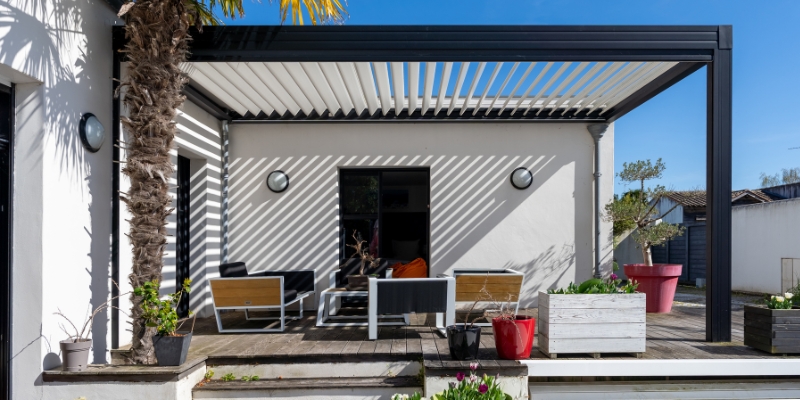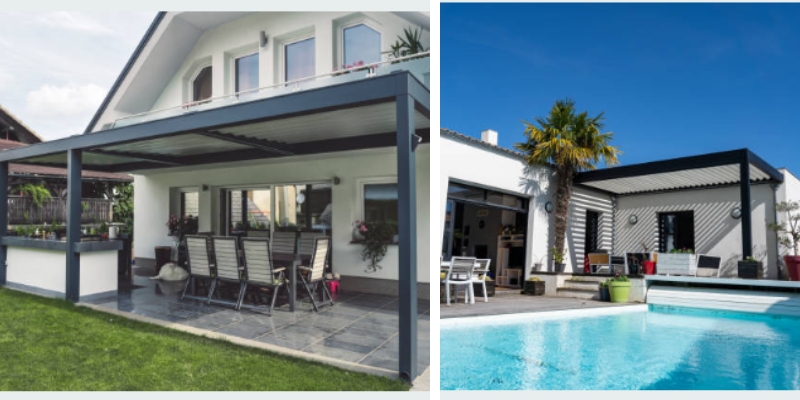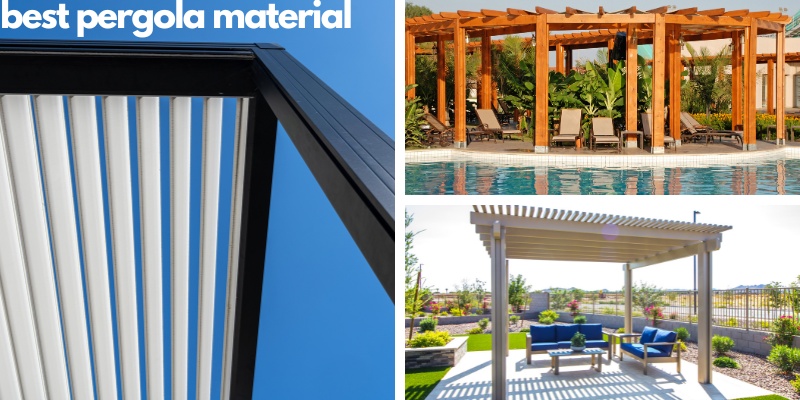
Are you considering adding a pergola to your home, but not sure which material to choose?
Pergolas are one of the most popular outdoor structures that provide a fusion of shade, privacy, aesthetic appeal, a hub for friends and family to get together, while also increasing the value of your property.
But with so many materials to choose from – vinyl, wood, aluminum, fiberglass, and PVC – determining the ideal pergola material for your patio or backyard area can be a rather daunting task.
In this article, we’ll discuss the most popular pergola materials with their pros and cons to help you choose the best material for your specific pergola project.
Pergola Material Selection: A Brief Guide
All pergola materials have their benefits and drawbacks. So the best pergola material is often subjective and mainly depends upon:
- Climate: You must take your climate into consideration when choosing the material for your pergola. For example, in dry climates, both wood and aluminum are suitable options. However, in humid climates, it’s advisable to avoid using wood. Likewise, the frequency and intensity of rains, snow, and winds play pivotal roles in the material selection process for your pergola.
- Budget: Pergolas made from some materials are pricier than others. For example, wooden pergolas are quite affordable, while aluminum and fiberglass pergola kits often come with higher price tags. If we talk only about material. If we compare installation costs, then it is a different story.
- Design and Aesthetics: Are you a fan of the natural beauty and aesthetics of wood, or do you prefer a sleek and sophisticated pergola design? Aluminum pergolas are usually highly customizable, while wooden pergolas are more minimalistic and rustic.
Which Pergola Material is the Best?
Following are some of the most popular types of pergolas based on the type of material they are made from:
Aluminum Pergolas
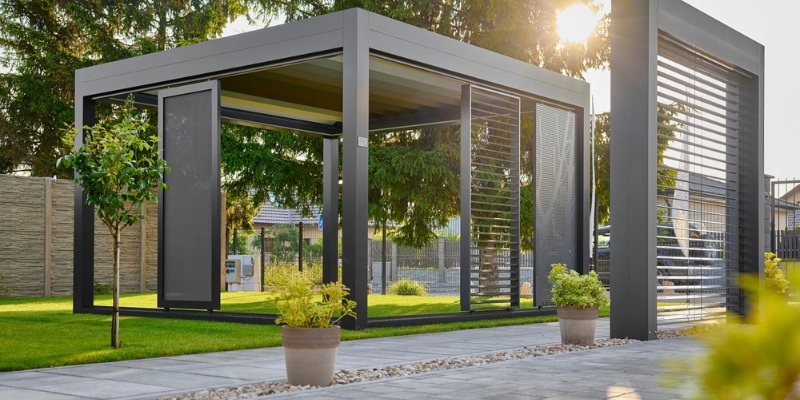
Currently, aluminum stands out as the premier material for pergolas, with aluminum pergolas swiftly replacing their wooden pergolas.
Aluminum is not only lightweight, but also exceptionally sturdy and corrosion-resistant. This makes aluminum pergolas a superior choice for weather resilience.
A noteworthy aspect of aluminum pergolas is that most top-tier brands primarily use aluminum as the material for their pergolas. So aluminum pergolas are the ones that are receiving all the cutting edge features and upgrades that most other pergolas lack.
However, not all aluminum pergolas are of equal quality. You must buy an aluminum pergola from a renowned brand (like Hanso Home or Struxure), as the quality of the aluminum material significantly impacts performance.
Many types of aluminum and its alloys are being used by popular pergola brands, like 6005 T5 Alloy, 6063 T6 alloy, extruded aluminum, and powder-coated aluminum.
Positives
- Remarkable resilience and longevity
- Minimal maintenance requirements
- Often easy to assemble
- Wide range of designs and styles available
- Resistant to rotting, rusting, and fading
- Lightweight
- No worrying about re-painting and re-staining
Negatives
- Might be pricey (depending on the vendor)
- They can get hot in direct sunlight
- Can be noisy in strong winds
Wood Pergolas
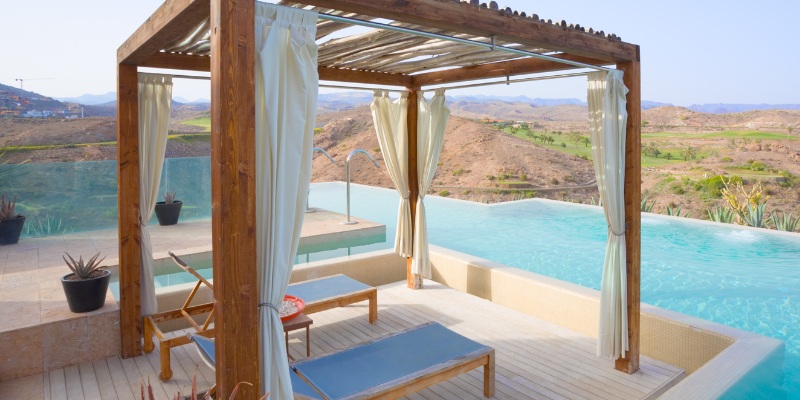
Despite the growing popularity of aluminum pergolas, wood is still the most common pergola material.
Many people still prefer a traditional wood pergola over aluminum and vinyl pergolas due to the natural look and texture of wood, because the aesthetics of wooden pergolas are unparalleled.
A wooden pergola provides the charm and elegance to your outdoor space that no pergola made from other materials can.
The most common types of wood used for pergolas are Cedar, Douglas Fir, Pine, and Redwood. Cedar stands out as the premium choice for pergolas, and pressure-treated wood is the popular alternative to cedar wood.
However, wood isn’t the ideal material for durability because it’s affected by the environment and is very high maintenance as well. Also, usually, no one mentions that you could hurt yourself if you don’t maintain it carefully (for example get a splinter).
Positives
- Unbeatable aesthetic appeal
- Can be painted and stained
- Affordable
- Cedar pergolas have a unique scent
- Versatile material
Negatives
- High-maintenance
- Prone to rotting, fading, and damage by pests
- Weather damage is really common
- Frequent re-painting and re-staining is needed
- The assembly is often hard and takes more than one day
- Expensive installation costs
Vinyl Pergolas
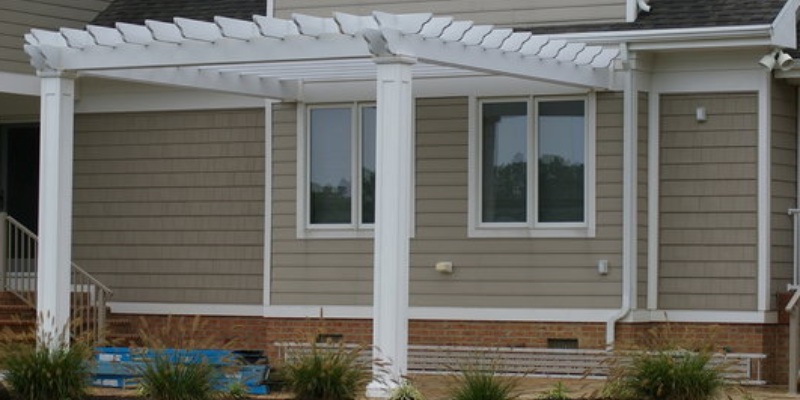
Vinyl pergolas have emerged as a relatively modern option, and much like aluminum pergolas, they too are gaining attention but to a lesser extent.
Vinyl ranks among the most durable materials for pergolas, and some renowned pergola brands are primarily manufacturing vinyl pergolas due to their low maintenance and longevity.
If you are looking for a middle ground between wood and aluminum pergolas, a vinyl pergola kit may offer an optimal solution.
They are often less expensive than aluminum, and require less upkeep than wood pergolas. Additionally, they also come with better features than wooden pergolas.
However, it’s worth noting that if aesthetics are a top priority for you, a vinyl pergola might not be your favorite choice for enhancing your outdoor space due to its artificial look.
Positives
- Low maintenance
- Doesn’t need re-painting or re-staining
- More affordable than aluminum pergolas
- Offer excellent weather protection
- Resistant to rot
- A variety of colors and designs available in vinyl pergolas
Negatives
- Can undergo fading and discoloration over time
- Cannot be painted
- An artificial look
- More expensive than wooden pergolas
- Must be very thick if strength is desired
Other Pergola Materials
When searching for the best pergola for your outdoor living space, you’ll likely encounter wood, aluminum, and vinyl pergolas as the most common options. However, several other materials are used for manufacturing pergolas as well.
Among the less common but noteworthy pergola materials are fiberglass, steel, PVC, and certain composite materials.
- Fiberglass pergolas present a compelling choice, offering a combination of sturdiness, lightweight design, and low maintenance. They can be an appealing alternative for those who prefer not to opt for aluminum or vinyl pergolas. But fiberglass can be brittle and is not ideal for extreme weather conditions.
- Steel pergolas are among the most durable pergolas and are the best aluminum alternative for extreme weather, including hurricanes and heavy snowfalls. However, they are quite heavy, have a hectic assembly, and are often pricier than their aluminum, vinyl, and wooden counterparts.
- PVC pergolas are also known for their low maintenance, lightweight nature, and durability. They often have a strong metal, like aluminum, in their interior. However, PVC pergolas don’t possess the same level of strength as their metallic counterparts and wooden counterparts.
Conclusion
Many materials are used for manufacturing pergolas and every material has its own benefits and drawbacks, but aluminum pergolas have the most favorable risk-benefit ratio.
Aluminum pergolas are not only the most advanced and upgraded, but are also the most durable, sturdy, and fairly priced pergolas.
However, should aluminum pergolas not align with your preferences for some reason, then cedar pergolas and vinyl pergolas are the top alternatives.
Ultimately, the ideal material for your pergola project hinges on a combination of factors, including your personal needs and preferences, environmental conditions, and your budget.

